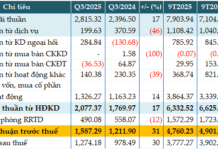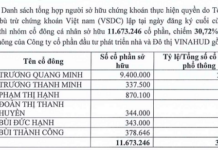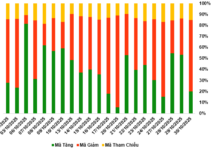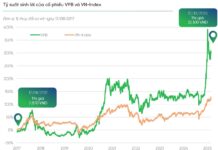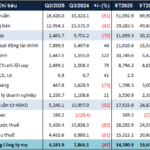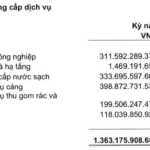
The private sector has been at the forefront of Vietnam’s economic growth, creating jobs and improving productivity. (Photo: Nguyen Dung/VNA)
|
As Vietnam celebrates the 80th anniversary of its National Day (September 2, 1945 – September 2, 2025), it is an opportunity to reflect on the country’s proud developmental journey.
From an agrarian economy facing numerous challenges, Vietnam has risen to become a resilient and innovative nation, deeply integrated into the global economy, and achieving significant milestones.
Throughout this transformation, the country’s economy has demonstrated its adaptability, evolving through various historical phases to embrace the digital age with aspirations to catch up with the region and the world.
Legislative Resolutions Pave the Way
According to Dr. Can Van Luc, a member of the National Financial and Monetary Policy Advisory Council, the private sector has always played a crucial role in Vietnam’s economic development.
In the early days of independence, this sector contributed to the resilience of the economy amid immense difficulties, providing resources for both the resistance and nation-building efforts.
During periods of economic fluctuations, the private sector faced contractions due to management mechanisms, but it persevered in small-scale production, handicrafts, and traditional trade.
 Operations at Xuan Hoa Joint Stock Company’s stamping workshop in Phuc Yen City, Vinh Phuc Province. (Photo: Tran Viet/VNA)
|
The initiation of the Doi Moi (renovation) policy in 1986 marked a significant turning point, with a shift in thinking and the establishment of a favorable framework for the revival and robust growth of the private sector.
Today, the private sector is a dynamic and innovative force, making significant contributions to economic growth, employment generation, and international integration.
Numerous large private enterprises have solidified their positions domestically and are gradually expanding their presence in the region and globally.
Notably, many Vietnamese entrepreneurs have ventured into new technologies, e-commerce, digital finance, and smart logistics, showcasing their pioneering spirit in the digital transformation journey.
Dr. Can Van Luc attributes this success to the Party and State’s sound policies, particularly the issuance of Resolution No. 68-NQ/TW on May 4, 2025, by the Politburo on private sector development.
This resolution provided a conducive legal framework and underscored the sector’s importance as a driving force. It also encouraged enterprises to embrace innovation, enhance product quality, expand their markets, and actively integrate into the global economy.
The private sector not only generates economic value but also contributes to social stability. Millions of small and medium-sized enterprises and household businesses provide employment for a large portion of the population, improving incomes and enhancing people’s lives.
Additionally, this sector is increasingly engaged in export activities, helping to expand international markets for Vietnamese goods.
Some private conglomerates have become prominent partners in technology, real estate, finance, and retail, elevating Vietnam’s economic stature on the world stage.
However, the private sector still faces challenges, including small scale, low labor productivity, limited access to capital and technology, and administrative hurdles. Their participation in global value chains remains modest, which is crucial for enhancing competitiveness.
To unleash the sector’s full potential, Dr. Can Van Luc suggests focusing on three key orientations: significantly improving the business environment, reducing costs for enterprises, encouraging governance innovation, and promoting transparency; supporting businesses in accessing resources such as capital, land, technology, and markets; and fostering a culture of entrepreneurship and innovation.
Additionally, investing in human capital development, enhancing digital and management skills, and fostering domestic and international linkages are essential.
By implementing these solutions in a synchronized manner, the private sector will continue to cement its role as a pillar and a pioneer in the country’s integration and digital transformation journey.
Digital Economy Fuels Sustainable Growth
Currently, the digital economy is emerging as a vital driver of the country’s overall economic development.
According to Dr. Nguyen Dinh Chuc, Director of the Institute of Vietnam and World Economics (Vietnam Academy of Social Sciences), the growth of the digital economy in recent years has brought about profound changes, presenting Vietnam with a golden opportunity to achieve rapid growth while pursuing sustainable development and narrowing the gap with advanced nations.

Cashless payment. (Photo: Nguyen Thanh/VNA)
|
The digital economy is making its presence felt across various sectors. In agriculture, digital applications enable crop and livestock monitoring, reducing costs and increasing productivity, thus promoting smarter and more sustainable farming practices.
In the industrial sector, modern production lines, smart factories, and digital management systems are being adopted to enhance efficiency and minimize resource waste.
In the service sector, e-commerce is thriving, digital banking and finance are becoming mainstream, and cashless payments are gaining traction, contributing to a more transparent and modern economy.
Beyond the business sphere, the digital economy is also driving administrative reforms and the development of e-government. High-quality online public services save time and costs while reducing management-related issues.
Several localities are leading the way in e-government and smart city development, demonstrating their commitment to efficient governance and improved services for citizens and businesses, thereby strengthening the foundation for sustainable development.
According to Dr. Nguyen Dinh Chuc, the digital economy is not a separate sector but a new development paradigm that fosters innovation across the entire economy. It fosters creative business models, expands entrepreneurial opportunities, empowers the private sector to be more dynamic, and enhances national competitiveness.
More importantly, the digital economy contributes to comprehensive and sustainable development by creating economic and social value and improving people’s quality of life.
However, to seize these opportunities, Vietnam must also address several challenges: limited research and innovation capabilities, a shortage of high-tech human resources, particularly in AI, big data, and cybersecurity; inadequate digital infrastructure, and a need for further legal refinement. International experiences offer valuable lessons in this regard.
South Korea’s success stems from its combination of heavy investment in telecommunications infrastructure and policies focused on high-tech human resource development. Singapore views data and digital connectivity as strategic assets and builds smart city models alongside transparent governance.
China leverages its vast market to promote e-commerce and digital payments, making the digital economy a foundation for sustainable consumption.
These experiences provide insights for Vietnam to adapt and formulate suitable strategies.
According to Dr. Nguyen Dinh Chuc, to ensure that the digital economy fuels sustainable growth, Vietnam should expedite the completion of relevant institutions and laws regarding electronic transactions, data protection, and regulatory sandboxes for new business models.
Simultaneously, investing in modern digital infrastructure, expanding new-generation telecommunications, establishing large-scale data centers, and developing cloud computing capabilities are imperative.
Another urgent task is to develop digital human resources, aligning educational programs with the practical needs of businesses while attracting international experts and fostering public-private collaboration in enhancing high-tech skills.
Encouraging enterprises to embrace innovation is also key. Building a digital startup ecosystem, nurturing “Make in Vietnam” tech enterprises, and expanding international cooperation will enable Vietnam to seize the opportunities presented by the Fourth Industrial Revolution while maintaining its commitment to sustainable development.
Dr. Nguyen Dinh Chuc emphasizes that the digital economy is Vietnam’s golden opportunity to catch up with advanced nations and realize its vision of becoming a high-income country by the middle of the 21st century, underpinned by rapid and sustainable growth.
Ly Thanh Huong
– 08:52 01/09/2025
The Four Pillars of a Bright Future
“Speaking to reporters, Professor Nguyen Viet Chuc, former Vice Chairman of the National Assembly’s Committee for Culture and Education, emphasized that each resolution within the Politburo’s ‘quadrilateral strategic resolutions’ (Resolutions 57, 59, 66, and 68) delves into specific areas of expertise. However, these resolutions are not siloed but are intricately interconnected, forming a cohesive whole that serves the nation’s development in this new era.”
“Preserving Currency Value, Instilling Investor Confidence”
The banking industry is at the forefront of monetary policy, proactively and adeptly steering the nation’s currency. With a dynamic approach to financial strategy, it safeguards the country’s economic lifeline.
Nurturing an Environment to Foster Private Enterprise Growth
Resolution 68-NQ/TW was enacted with the aspiration to serve as a catalyst for the private sector’s robust quantitative and qualitative growth. However, to materialize this vision, an “incubation” mechanism is imperative to nurture a multitude of high-caliber private enterprises that can spearhead the development of the business community.








